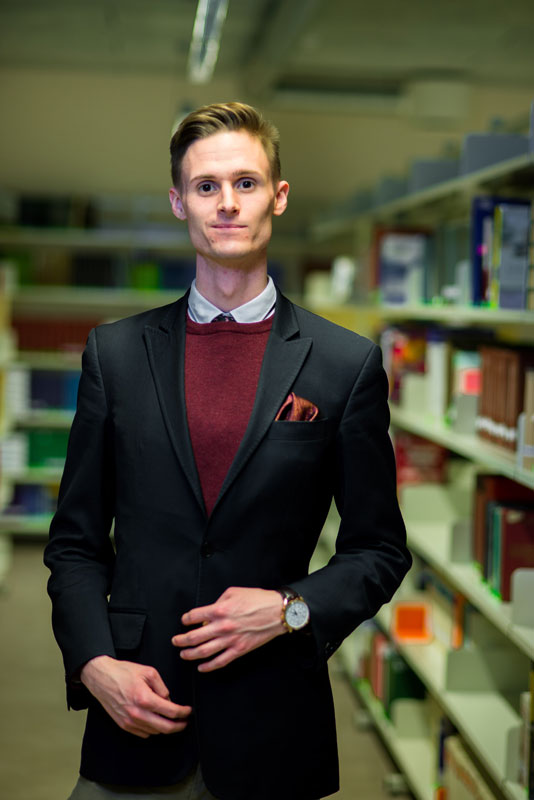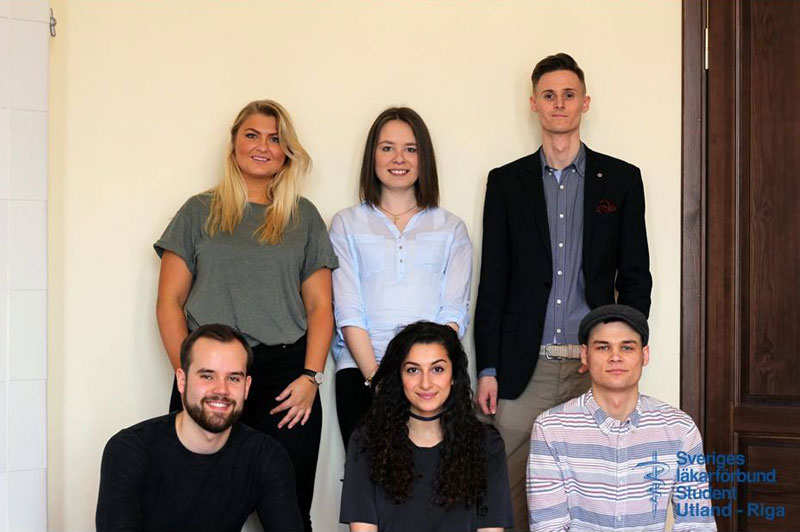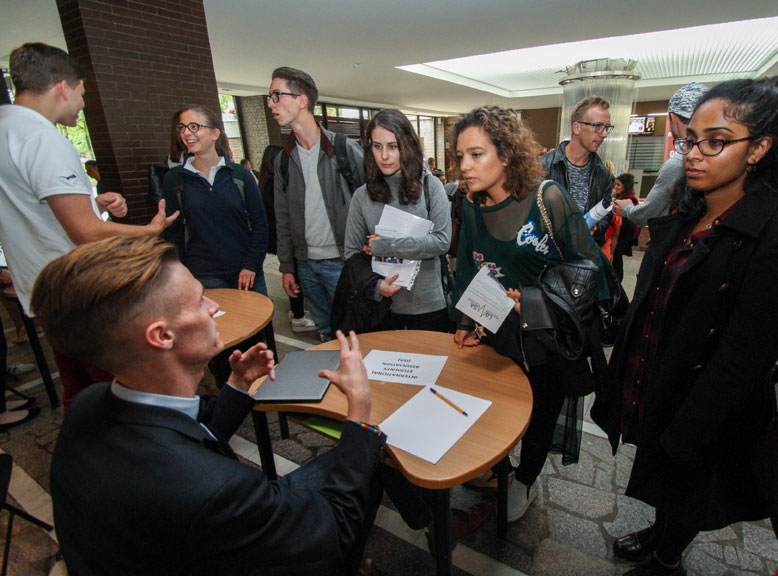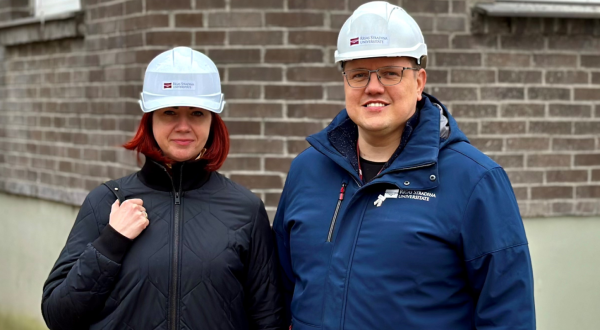On the road towards becoming a doctor and healthcare policy maker
To improve global healthcare, medical practitioners have to engage in medical policy-making processes. Global improvements in healthcare are possible only if medical practitioners contribute to policy making. Within our themed series “Doctor – it's a mission” we recently interviewed RSU medical student Alexander Wyckoff-Mähler who shared with us his experience at RSU, his plans for the future and revealed his willingness to be part of global healthcare policy-making processes someday.
 Tell us about yourself.
Tell us about yourself.
I am a 24-year-old half American, half Swedish, 4th year medical student. I was born in Stockholm Sweden, my family moved to Reno Nevada, USA when I was 3 months old, I lived there until 6 years of age, then my parents decided to move back to Sweden. Besides my studies and my involvement in Riga’s student affairs, I enjoy fruitful political and philosophical discourse. Medicine is my main interest, although anthropology, sociology, history and practical philosophy are not far behind. I am a proud owner of a shy but loving dog named Charlie together with my two Swedish roommates who also attend RSU. I love cooking, dancing, sports climbing and reading.
Why do you want to become a doctor / medical professional?
When I was living in the United States as a very young boy, both my parents became severely ill. My father was diagnosed with a brain tumor and my mother with skin cancer. This resulted in my brother and me spending a great deal of our time in different hospitals. This is where I developed my desire of becoming a medical doctor as I witnessed both the horrors of disease and the greatness of medical staff who had the power to alleviate the burden of illness. In later years and after a few university courses in social anthropology, the horizons of my medical fascination expanded and I found a greater appreciation for global and public health. After taking an online course held by the late professor Hans Rosling concerning these topics, my persuasion to pursue medicine grew even larger. My dream and goal is to work with medical issues at global level, for example to work for the World Health Organization or the United Nations to form better policies, medical guidelines and to ensure fair and transparent distribution of medical aid as well as budget globally.
Why did you choose to study at RSU?
After graduating upper secondary school, my grades were on the borderline for being accepted by a medical program in Sweden. My initial idea was to apply in Sweden year-by-year and eventually get in, but as time passed, my acceptance letter never came. So I decided to look for opportunities abroad and that is how I came across RSU and Riga, which I knew very little about. After visiting RSU and Riga on an Open Day (which I highly recommend), I knew that this was the university and city for me. I enjoy the international feeling, that the program is in English, and the style of teaching. After talking with several students, I saw that the camaraderie among international students is excellent and that the student life is rich and diverse (something I can now confirm). Riga is a great city with everything you need and it is close to Stockholm by flight if you miss your family.
Now after having the opportunity to transfer to Sweden as the admittance requirements have slightly decreased, I chose to continue my studies at RSU as I enjoy the university, the community and the city. Looking back, I am very glad that I moved to Riga, as I have grown and experienced things that Swedish universities or Sweden could not offer; I have simply made a second home.
Throughout your academic career, you have been active in various student organisations. Please tell us about your experience and responsibilities at the International Students’ Association (ISA). What is your current role at the ISA?
I started my engagement already in the first semester, being elected group and semester leader, a position I held for two years prior to handing it over to a brilliant classmate Mathilda Säll. I joined ISA as I wanted to work with student issues at a wider scale, academic issues, in particular. Thus, I ran for the position and was elected the Head of Academic Affairs (HoAA) for the 2016 board. In short, as HoAA your responsibilities are to oversee the academic process and wellbeing of international students. You must know the academic rights and obligations of students and be able to counsel students when questions or academic conflicts arise. HoAA is a demanding but very rewarding position and I have mostly made only good experience during my term. Most questions and everyday issues are quite straightforward and solvable, but the impact can be huge as you can significantly decrease the stress level of a student with something as simple as making sure he has signed his study contract in time thus preventing from “losing” a semester. Being HoAA was one of the greatest experiences of my academic carrier and I recommend the position to anyone interested in dealing with student matters and ready for a challenge.
Currently I am the Chief Advisor what means that I assist in any project or matter that ISA is working on if needed. Earlier this semester I worked upon recruitment of activists, the Teddy Bear Hospital, and have now shifted my attention more to the academic spectrum of ISA’s work. Working with the ISA board 2017 and all of the activists is truly an honor and I would recommend anyone willing to be more involved to contact us in order we could join you in.

Are you also engaged with the Swedish Medical Students’ Association? How?
I am the current Vice-Chairman of the Swedish Medical Students’ Association in Riga (SLFSR) which represents the interests of Swedish medical students. Earlier this year we underwent reorganization, renamed the organization and joined the Swedish Medical Association (Sveriges Läkarförbund) as we wanted to strengthen the ties between Latvian and Swedish communities. We hold not only social events such as banquets or monthly pub nights, but also academic events e. g. guest lectures.
I try to assist in all areas of SLFSR, but my main responsibility this semester was to oversee the drafting of our statutes as I have previous experience with drafting and amending ISA statutes. However, I must say that the most amusing project I assisted in, was the filming of one of the promotional videos that we post on our Facebook page. It was a truly entertaining and creative break from our studies and I am looking forward in working more with such projects. Honesty, I find it to be extremely rewarding to work with such an ambitious and dedicated board; and I am very proud of all that we have accomplished in such a short time.

You have greatly contributed to the Orientation Week for RSU’s new international students. What is the main message that you have communicated to them? Why is this message important?
I feel that I have conveyed two very important messages; the first one is “do not worry, it is manageable”. Everything is new to a first semester student what in my opinion is also the reason for the semester being so difficult. Although the study load is lower than in subsequent semesters, the cultural shift, meeting a great deal of new people, finding an apartment, navigating through Riga, dealing with the Office of Citizenship and Migration Affairs (OCMA) and understanding the way RSU works and what it expects from you, adds a great deal of stress to the semester. I would highly recommend not to listen to senior students who say, “The first semester is so easy”. I would argue that this opinion does not incorporate other external factors that increase the stress load. It is also worth noting that there is a fantastic camaraderie among international students and there are always fellow students who will gladly help you if approached.

The second message that I feel very strong about and which I always mention at the end of my presentation during the Orientation Week is that, if anyone has any questions concerning the LGBT+ community, they can always approach me as I am openly gay and have experience with this in Riga. I have had people both belonging to the community and/or allies, addressing me with their questions and concerns, as most people do not know how it is in Riga. Of course, people are always welcome to address me with any questions they might have.
Are there any other charitable, social and / or professional activities in which you are personally involved?
I am currently working on a project that will be launched during the summer. This project explores different possibilities for a medical student to volunteer abroad. I will mostly deal with such aspects of volunteering as: where, how and at what expense. The project will also address the level of impact your volunteer or charity work has locally and globally. For example, does working at a local clinic assisting doctors in their daily duties have more of an impact than working with sexual health education for young adults and teenagers?
So, keep an eye out during the summer to be part of the inquiry!
Related news
 RSU is growing and developing: major reconstruction underway in the main buildingDevelopment, For RSU Employees, For Students
RSU is growing and developing: major reconstruction underway in the main buildingDevelopment, For RSU Employees, For Students


